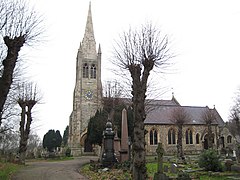Buckhurst Hill
| Buckhurst Hill | |
|---|---|
 The parish church of St John the Baptist was built in 1838 |
|
| Buckhurst Hill shown within Essex | |
| Population | 11,380 (2011) |
| OS grid reference | TQ415935 |
| • London | 10.0 mi (16.1 km) SW |
| Civil parish |
|
| District | |
| Shire county | |
| Region | |
| Country | England |
| Sovereign state | United Kingdom |
| Post town | LONDON |
| Postcode district | IG9 |
| Dialling code | 020 |
| Police | Essex |
| Fire | Essex |
| Ambulance | East of England |
| EU Parliament | East of England |
| UK Parliament | |
| Website | www |
Buckhurst Hill is an affluent suburban town in the metropolitan area of London, England and the Greater London Urban Area. It falls within the Epping Forest District, and borders the London Borough of Redbridge in East London. The railway line was opened in 1856 as part of the Eastern Counties Railway; a middle-class development resulted from this line.
The first mention of Buckhurst Hill is in 1135, when reference was made to "La Bocherste", becoming in later years "Bucket Hill", originally meaning a hill covered with beech trees. It lay in Epping Forest and consisted of only a few scattered houses along the ancient road from Woodford to Loughton. Before the building of the railways Buckhurst Hill was on the stage coach route between London and Cambridge, Norwich, Bury St Edmunds and Dunmow. Originally it was a part of the parish of Chigwell; there was no road connecting the two communities and in order to get to church, parishioners had to ford the River Roding at Woodford. The Parish Church of St John was built in 1838 as a chapel of ease but did not become a separate ecclesiastical parish until 1867. St John's National School was also built in 1838. The lord of the manor gave a site next to the church; the building cost £209, most of which was donated by the church congregation. The opening of Buckhurst Hill Station in 1856 saw a rapid expansion in the population of the area; nearly six hundred new houses had been built near the station by 1871. Some of the land for this expansion was enclosed from Epping Forest, before this practice was halted by the Epping Forest Act, 1878.
...
Wikipedia

